(2001) The Bonesetter's Daughter Read online
Page 5
“Examples of mundane.”
“Mealtime, for instance. Perhaps dinner always happens at six and Mom is an elaborate planner, dinner is a ritual, but nothing happens, no talk, unless it’s argument. Or meals are eaten catch-as-catch-can. With just these contrasts, the child might grow up thinking either that day and night are predictable, though not always pleasant, or that the world is chaotic, frantic, or freely evolving. Some children do beautifully, no matter what the early influences. Whereas others grow up into great big adults who require a lifetime of very, very expensive psychotherapy.”
Ruth listened to their laughter on the tape. She had never gone into therapy, as Wendy had. She worked with too many therapists, saw that they were human, full of foibles, in need of help themselves. And while Wendy thought it worthwhile to know that a professional was dedicated to her and her alone for two one-hour sessions a week, Ruth could not justify spending a hundred fifty dollars an hour to listen to herself talk. Wendy often said Ruth should see a shrink about her compulsion with number counting. To Ruth, however, the counting was practical, not compulsive; it had to do with remembering things, not warding off some superstitious nonsense.
“Ruth, darling,” Agapi’s taped voice continued, “can you look at the folder marked ‘Fascinating Case Studies’ and pick out suitable ones for this chapter?”
“Okay. And I was thinking, how about including a section on the cosmology imparted by television as artificial caregiver? Just a suggestion, since it would probably also work as an angle for television shows and radio interviews.”
“Yes, yes, wonderful! What shows do you think we should do?”
“Well, starting with the fifties, you know, Howdy Doody, The Mickey Mouse Club, all the way to The Simpsons and South Park—”
“No, dear, I mean what shows I might be on. Sixty Minutes, Today, Charlie Rose—oh, I would love to be on that show, that man is so sexy… .”
Ruth took notes and started an outline. No doubt Agapi would call her that night to discuss what she had written. Ruth suspected she was the only writer in the business who believed a deadline was an actual date.
Her watch sounded at eleven. She tapped her finger, Eight, call Gideon. When she reached him, she began with the demands of the Internet Spirituality author. “Ted wants me to push everything else aside and make his project top priority under rush deadlines. I was very firm about saying I couldn’t do that, and he hinted pretty strongly that he might replace me with another writer. Frankly, I’d be relieved if he fired me,” Ruth said. She was preparing herself for rejection.
“He never will,” Gideon replied. “You’ll cave in, you always do. You’ll probably be calling HarperSanFrancisco by the end of the week, persuading them to change the schedule.”
“What makes you say that?”
“Face it, sweetheart, you’re accommodating. Willing to bend over backward. And you have this knack for making even the dickheads believe they’re the best at what they do.”
“Watch it,” Ruth said. “That’s a hooker you’re describing.”
“It’s true. You’re a dream when it comes to collaboration,” Gideon went on. “You listen as the clients blather on, egos unchecked. They walk all over you, and you just take it. You’re easy.”
Why wasn’t Art hearing this? Ruth wanted to gloat: See, others don’t think I’m difficult. Then she realized Gideon was saying she was a pushover. She wasn’t really, she reasoned. She knew her limits, but she wasn’t the type to get into a conflict over things that were ultimately not that important. She didn’t understand people who thrived on argument and being right all the time. Her mother was that way, and what did that get her? Nothing but unhappiness, dissatisfaction, and anger. According to her mother’s cosmology, the world was against her and no one could change this, because this was a curse.
But the way Ruth saw it, LuLing got into fights mainly because of her poor English. She didn’t understand others, or they didn’t understand her. Ruth used to feel she was the one who suffered because of that. The irony was, her mother was actually proud she had taught herself English, the choppy talk she had acquired in China and Hong Kong. And since immigrating to the United States fifty years before, she had not improved either her pronunciation or her vocabulary. Yet her sister, GaoLing, had come to the States around the same time, and her English was nearly perfect. She could talk about the difference between crinoline and organza, name the specific trees she liked: oak, maple, gingko, pine. To LuLing, cloth was classified as “cost too much,” “too slippery,” “scratchy skin,” and “last long time.” And there were only two kinds of trees: “shady” and “drop leaf all the time.” Her mother couldn’t even say Ruth’s name right. It used to mortify Ruth when she shouted for her up and down the block. “Lootie! Lootie!” Why had her mother chosen a name with sounds she couldn’t pronounce?
But this was the worst part: Being the only child of a widow, Ruth had always been forced to serve as LuLing’s mouthpiece. By the time she was ten, Ruth was the English-speaking “Mrs. LuLing Young” on the telephone, the one who made appointments for the doctor, who wrote letters to the bank. Once she even had to compose a humiliating letter to the minister.
“Lootie give me so much trouble,” LuLing dictated, as if Ruth were invisible, “maybe I send her go Taiwan, school for bad children. What you think?”
Ruth revised that to: “Perhaps Ruth might attend a finishing school in Taiwan where she can learn the manners and customs of a young lady. What is your opinion?”
In an odd way, she now thought, her mother was the one who had taught her to become a book doctor. Ruth had to make life better by revising it.
At three-ten, Ruth finished paying the plumber. Art had never come home, nor had he called. A whole new water heater was needed, not just a replacement part. And because of the leak, the plumber had had to shut off the electricity to the entire flat until he had suctioned out the standing water and removed the old tank. Ruth had been unable to work.
She was running late. She faxed the outline to Agapi, then raced around the house, gathering notes, her cell phone, her address book. Once in the car, she drove to the Presidio Gate and then through the eucalyptus forest to California Street. Her mother lived fifty blocks west, in a part of San Francisco known as the Sunset district, close to Land’s End.
The doctor’s appointment was ostensibly a routine visit. Her mother had overlooked having an annual checkup for the last few years, though it was included free in her HMO plan. LuLing was never sick. Ruth could not remember the last time she had had the flu or even a cold. At seventy-seven, her mother had none of the common geriatric problems, arthritis, high cholesterol, or osteoporosis. Her worst ailment—the one she frequently complained about to Ruth, in excruciating detail—was constipation.
Recently, though, Ruth had some concerns that her mother was becoming not forgetful, exactly, but careless. She would say “ribbon” when she meant “wrapping paper,” “envelope” when she meant “stamp.” Ruth had made a mental list of examples to tell the doctor. The accident last March, she should mention that as well. LuLing had bashed her car into the back of a truck. Luckily, she had only bumped her head on the steering wheel, and no one else was hurt. Her car was totaled.
“Scare me to pieces,” LuLing had reported. “My skin almost fall off.” She blamed a pigeon that had flown up in front of her windshield. Maybe, Ruth now considered, it was not a nutter of wings, but one in her brain, a stroke, and the bump on her head was more serious, a concussion, a skull fracture. Whatever was wrong, the police report and insurance company said it was LuLing’s fault, not the pigeon’s. LuLing was so outraged that she canceled her car insurance, then complained when the company refused to reinstate her policy.
Ruth had related the incident to Agapi Agnos, who said inattention and anger could be related to depression in the elderly.
“My mother’s been depressed and angry all her life,” Ruth told Agapi. She did not bring up the threats of suic
ide, which she had heard so often she tried not to react to them.
“I know of some excellent therapists who’ve worked with Chinese patients,” Agapi said. “Quite good with cultural differences—magical thinking, old societal pressures, the flow of ch’i.”
“Believe me, Agapi, my mother is not like other Chinese people.” Ruth used to wish her mother were more like Auntie Gal. She didn’t talk about ghosts or bad luck or ways she might die.
“In any case, my dear, you should have a doctor give her a thorough, thorough checkup. And you put your arms around her and give that mother of yours a great big healing hug from me.” It was a nice thought, but Ruth rarely exchanged embraces with LuLing. When she tried, her mother’s shoulders turned rigid, as if she were being attacked.
Driving toward LuLing’s building, Ruth entered the typical fog of summer. Then came block after block of bungalows built in the twenties, cottages that sprang up in the thirties, and characterless apartments from the sixties. The ocean view skyline was marred by electrical wires strewn from pole to house and house to pole. Many of the picture windows had sea-misty smears. The drainpipes and gutters were rusted, as were the bumpers of old cars. She turned up a street lined with more upscale homes, architectural attempts at Bauhaus sleekness, their small lawns decorated with shrubs cut in odd shapes, like the cotton-candy legs of show poodles.
She pulled up to LuLing’s place, a two-unit Mediterranean-style with an apricot-colored curved front and a fake bay window balcony with wrought-iron grating. LuLing had once proudly tended her yard. She used to water and cut the hedge herself, neaten the border of white stones that flanked the short walkway. When Ruth lived at home, she had had to mow the seven-by-seven foot squares of lawn. LuLing always criticized any edges that touched the sidewalk. She also complained about the yellow urine spots, made by the dog from across the street. “Lootie, you tell that man don’t let dog do that.” Ruth reluctantly went across the street, knocked on the door, asked the neighbor if he had seen a black-and-white cat, then walked back and told her mother that the man said he would try. When she went away to college and came home to visit, her mother still asked her to complain to the man across the street almost as soon as she walked in the door. The missing-cat routine was getting old, and it was hard to think of new excuses for knocking on the man’s door. Ruth usually procrastinated, and LuLing nagged about more and more yellow spots, as well as Ruth’s laziness, her forgetfulness, her lack of concern for family, on and on. Ruth tried to ignore her by reading or watching TV.
One day Ruth worked up the courage to tell LuLing she should hire a lawyer to sue the man or a gardener to fix the lawn. Her college roommate had suggested she say this, telling Ruth she was crazy to let her mother push her around as if she were still six years old.
“Is she paying you to be a punching bag?” her roommate had said, building the case.
“Well, she does give me money for college expenses,” Ruth admitted.
“Yeah, but every parent does that. They’re supposed to. But that doesn’t give them the right to make you their slave.”
Thus bolstered, Ruth confronted her mother: “If it bothers you so much, you take care of it.”
LuLing stared at her, silent for five full minutes. Then she burst like a geyser: “You wish I dead? You wish no mother tell you what to do? Okay, maybe I die soon!” And just like that, Ruth had been upended, flung about, was unable to keep her balance. LuLing’s threats to die were like earthquakes. Ruth knew that the potential was there, that beneath the surface, the temblors could occur at any time. And despite this knowledge, when they erupted she panicked and wanted to run away before the world fell down.
Strangely, after that incident, LuLing never mentioned anything about the dog peeing on the lawn. Instead, whenever Ruth came home, LuLing made it a point to take out a spade, get on her hands and knees, and painfully dig out the yellow spots and reseed them, two square inches at a time. Ruth knew it was her mother’s version of emotional torture, but still it made her stomach hurt as she pretended not to be affected. LuLing finally did hire someone to take care of the yellow spots, a cement contractor, who constructed a frame and a mold, then poured a patio of red and white concrete diamonds. The walkway was red as well. Over the years, the red diamonds faded. The white ones turned grimy. Some areas looked as though they had experienced the upheavals of Lilliputian volcanos. Spiny weeds and strawlike tufts grew in the cracks. I should call someone to spruce up the place, Ruth thought as she approached the house. She was sad that her mother no longer cared as much about appearances. She also felt guilty that she had not helped out more around the house. Perhaps she could call her own handyman to do cleanup and repairs.
As Ruth neared the steps to the upper unit, the downstairs tenant stepped out of her doorway, signaling that she wanted to speak to her. Francine was an anorexically thin woman in her thirties, who seemed to be wearing a size-eight skin over a size-two body. She often griped to Ruth about repairs needed for the building: The electricity kept shorting out. The smoke detectors were old and should be replaced. The back steps were uneven and could cause an accident—and a lawsuit.
“Never satisfy!” LuLing told Ruth.
Ruth knew not to take sides with the tenant. But she worried that there might really be a problem like a fire one day, and she dreaded the headlines “Slum Landlady Jailed, Ignored Deadly Hazards.” So Ruth surreptitiously handled some of the more resolvable problems. When she bought Francine a new smoke detector, LuLing found out and became apoplectic. “You think she right, I wrong?” As had happened throughout Ruth’s childhood, LuLing’s fury escalated until she could barely speak, except to sputter the old threat: “Maybe I die soon!”
“You need to talk to your mom,” Francine was now saying in a whiny voice. “She’s been accusing me of not paying the rent. I always pay on time, the first of the month. I don’t know what she’s talking about, but she goes on and on, like a broken record.”
Ruth had a sinking feeling. She did not want to hear this.
“I even showed her the canceled check. And she said, ‘See, you still have the check!’ It was weird, like she wasn’t making any sense.”
“I’ll take care of it,” Ruth said quietly.
“It’s just that she’s harassing me like a hundred times a day. It’s making me nuts.”
“I’ll get it straightened out.”
“I hope so, because I was just about to call the police to get a restraining order!”
Restraining order? Who’s the nut here? “I’m sorry this happened,” Ruth said, and remembered a book she helped write on mirroring a child’s feelings. “You must be frustrated when it’s clear you’ve done nothing wrong.”
It worked. “Okay, then,” Francine said, and backed into her doorway like a cuckoo in a Swiss clock.
Ruth used her own key to let herself into her mother’s apartment. She heard LuLing call to her: “Why so late?”
Seated in her brown vinyl easy chair, LuLing looked like a petulant child on a throne. Ruth gave her a once-over to see if she could detect anything wrong, a twitch in her eye, a slight paralysis, perhaps, on one side of her face. Nothing, the same old mom. LuLing was wearing a purple cardigan with gold-tone buttons, her favorite, black slacks, and size-four black pumps with low heels. Her hair was smoothed back and gathered like Fia’s and Dory’s, only she had the ponytail wound into a netted bun, thickened with a hairpiece. Her hair was jet-black, except for the roots at the back, where she could not see that she had failed to apply enough dye. From a distance, she looked like a much younger woman, sixty instead of seventy-seven. Her skin was even-toned and smooth, no need for foundation or powder. You had to stand a foot away before you could see the fine etching of wrinkles on her cheeks. The deepest lines were at the corners of her mouth, which were often turned down, as they were now.
LuLing groused. “You say doctor visit one o’clock.”
“I said the appointment was at four.”
�
�No! One o’clock! You say be ready. So I get ready, you don’t come!”
Ruth could feel the blood draining out of her head. She tried another tack. “Well, let me call the doctor and see if we can still get in at four.” She went to the back, where her mother did her calligraphy and painting, to the room that had been her own long before. On her mother’s drawing table lay a large sheet of watercolor paper. Her mother had started a poem-painting, then stopped in mid-character. The brush lay on the paper, its tip dried and stiff. LuLing was not careless. She treated her brushes with fanatical routine, washing them in spring water, not tap, so that chlorine would not damage them. Perhaps she had been in the middle of painting and heard the teakettle crying and bolted. Maybe the phone rang after that, one thing after another. But then Ruth looked closer. Her mother had tried to write the same character over and over again, each time stopping at the same stroke. What character? And why had she stopped in mid-flight?
When Ruth was growing up, her mother supplemented her income as a teacher’s aide with side businesses, one of which was bilingual calligraphy, Chinese and English. She produced price signs for supermarkets and jewelry stores in Oakland and San Francisco, good-luck couplets for restaurant openings, banners for funeral wreaths, and announcements for births and weddings. Over the years, people had told Ruth that her mother’s calligraphy was at an artist’s level, first-rate classical. This was the piecework that earned her a reliable reputation, and Ruth had had a role in that success: she checked the spelling of the English words.
“It’s ‘grapefruit,’” eight-year-old Ruth once said, exasperated, “not ‘grapefoot.’ It’s a fruit not a foot.”
That night, LuLing started teaching her the mechanics of writing Chinese. Ruth knew this was punishment for what she had said earlier.
“Watch,” LuLing ordered her in Chinese. She ground an inkstick onto an inkstone and used a medicine dropper to add salt water in doses the size of tears. “Watch,” she said, and selected a brush from the dozens hanging with their tips down. Ruth’s sleepy eyes tried to follow her mother’s hand as she swabbed the brush with ink, then held it nearly perpendicular to the page, her wrist and elbow in midair. Finally she began, flicking her wrist slightly so that her hand waved and dipped like a moth over the gleam of white paper. Soon the spidery images formed: “Half Off!” “Amazing Discounts!” “Going Out of Business!”

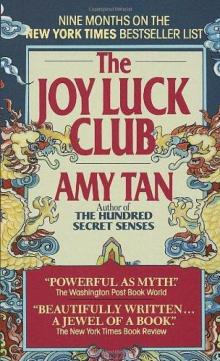 The Joy Luck Club
The Joy Luck Club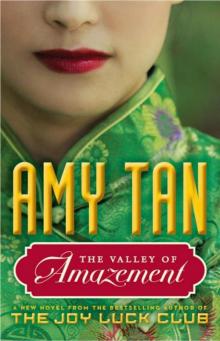 The Valley of Amazement
The Valley of Amazement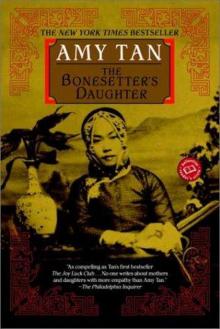 The Bonesetter's Daughter
The Bonesetter's Daughter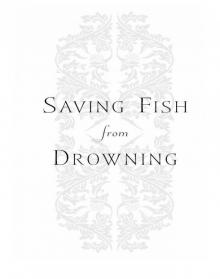 Saving Fish From Drowning
Saving Fish From Drowning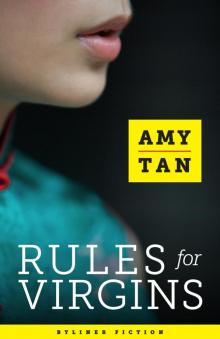 Rules for Virgins
Rules for Virgins The Kitchen God's Wife
The Kitchen God's Wife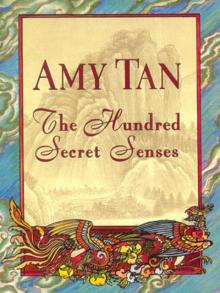 The Hundred Secret Senses
The Hundred Secret Senses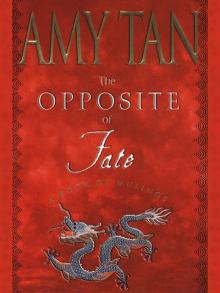 The Opposite of Fate: Memories of a Writing Life
The Opposite of Fate: Memories of a Writing Life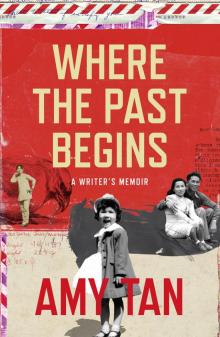 Where the Past Begins
Where the Past Begins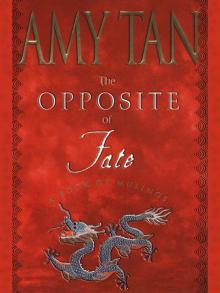 The Opposite of Fate
The Opposite of Fate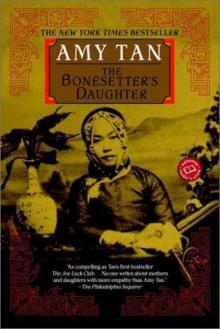 (2001) The Bonesetter's Daughter
(2001) The Bonesetter's Daughter